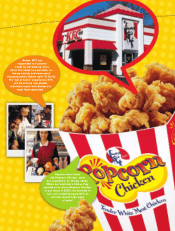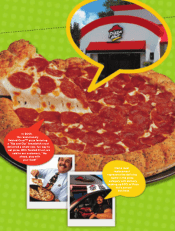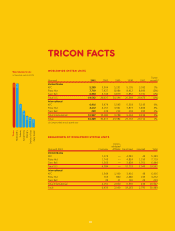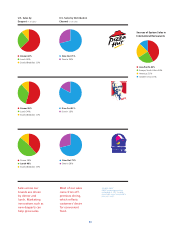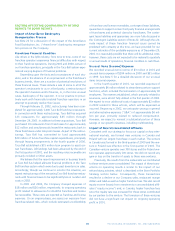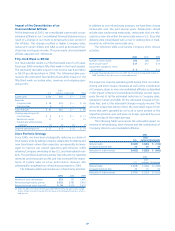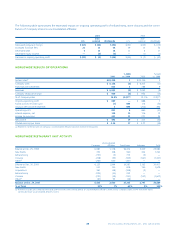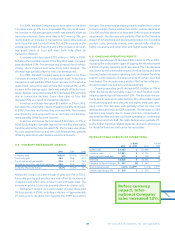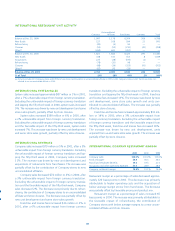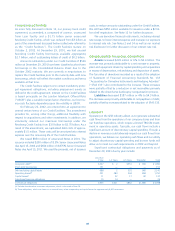Pizza Hut 2001 Annual Report Download - page 27
Download and view the complete annual report
Please find page 27 of the 2001 Pizza Hut annual report below. You can navigate through the pages in the report by either clicking on the pages listed below, or by using the keyword search tool below to find specific information within the annual report.
25
Management’s Discussion and Analysis
INTRODUCTION
TRICON Global Restaurants, Inc. and Subsidiaries (collectively
referred to as “TRICON” or the “Company”) is comprised of the
worldwide operations of KFC, Pizza Hut and Taco Bell (“the
Concepts”) and is the world’s largest quick service restaurant
(“QSR”) company based on the number of system units.
Separately, each brand ranks in the top ten among QSR chains
in U.S. system sales and units. Our 10,927 international units
make us the second largest QSR company outside the U.S. TRI-
CON became an independent, publicly owned company on
October 6, 1997 (the “Spin-off Date”) via a tax-free distribution
of our Common Stock (the “Distribution” or “Spin-off”) to the
shareholders of our former parent, PepsiCo, Inc. (“PepsiCo”).
TRICON has numerous registered trademarks and service
marks. We believe that many of these marks, including our
Kentucky Fried Chicken,
®KFC,
®Pizza Hut®and Taco Bell®trade-
marks, have significant value and are materially important to our
business. Our policy is to pursue registration of important trade-
marks whenever feasible and to oppose vigorously any
infringement of our trademarks. From time to time we may
become involved in litigation to defend and protect our use of
such registered marks. The use of our trademarks by franchisees
and licensees has
been authorized in
KFC, Pizza Hut and
Taco Bell franchise
and license agree-
ments. Under current
law and with proper
use, our rights in
trademarks can generally last indefinitely. We also have certain
patents on restaurant equipment which, while valuable, are not
material to our business.
Throughout Management’s Discussion and Analysis
(“MD&A”), we make reference to ongoing operating profit
which represents our operating profit excluding the impact of
facility actions net loss (gain), unusual items income (expense)
and our accounting and human resources policy changes in
1999 (the “1999 accounting changes”). See Note 5 to the
Consolidated Financial Statements for a detailed discussion of
these exclusions. We use ongoing operating profit as a key per-
formance measure of our results of operations for purposes of
evaluating performance internally and as the base to forecast
future performance. Ongoing operating profit is not a measure
defined in accounting principles generally accepted in the U.S.
and should not be considered in isolation or as a substitution
for measures of performance in accordance with accounting
principles generally accepted in the U.S.
In 2001, our international business, Tricon Restaurants
International (“TRI” or “International”) accounted for 35% of
system sales, 31% of revenues and 31% of ongoing operating
profit excluding unallocated and corporate expenses and foreign
exchange net loss. We anticipate that, despite the inherent risks
and typically higher general and administrative expenses
required by international operations, we will continue to invest
in key international markets with substantial growth potential.
This MD&A should be read in conjunction with our
Consolidated Financial Statements on pages 38 through 64 and
the Cautionary Statements on page 37. All Note references
herein refer to the Notes to the Consolidated Financial
Statements on pages 42 through 64. Tabular amounts are dis-
played in millions except per share and unit count amounts, or
as otherwise specifically identified.
CRITICAL ACCOUNTING POLICIES
Our reported results are impacted by the application of certain
accounting policies that required us to make subjective or com-
plex judgments. These judgments involve estimations about the
effect of matters that are inherently uncertain and may signifi-
cantly impact our quarterly or annual results of operations,
financial condition or cash flows. Changes in the estimates and
judgments could significantly affect our results of operations,
financial condition and cash flows in future years. We believe
that our most significant policies require:
• Estimation of cash flows associated with the disposition of
restaurants, and the impairment of long-lived assets and
investments in unconsolidated affiliates. See Note 2 for a fur-
ther discussion.
• Determination of the appropriate allowances and reserves
associated with franchise and license receivables and contin-
gent liabilities. See Note 2 for a discussion of the allowance
for uncollectible franchise and license receivables and Note 22
for a discussion of franchise contingent liabilities.
• Estimation, using actuarially-determined methods, of our self-
insured losses under our property and casualty loss programs.
See Note 22 for a discussion of our insurance programs.
• Determination of the appropriate valuation allowances for
deferred tax assets and reserves for potential tax exposures.
See Note 20 for a discussion of income taxes.
We are the largest
QSR Company
based on system
units.



